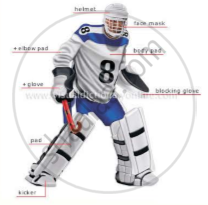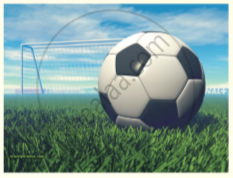Advertisements
Advertisements
Question
What happens to our body when we sleep?
Solution
Several things happen to our body while we are sleeping. The muscles relax, the heartbeat becomes slower, and the body temperature and the blood pressure go down. Our ever-active brain also slows down.
APPEARS IN
RELATED QUESTIONS
Answer of these question in a short paragraph (about 30 words).
How does he describe the old kind of teachers?
Answer these question in 30–40 words.
When and how did Bismillah Khan get his big break?
Use the suffixes −ion or −tion to form nuns from the following verbs. Make the necessary changes in the spellings of the words.
Example:proclaim − proclamation
| cremate ___ | act ___ | exhaust ___ |
| invent ___ | tempt ___ | immigrate ___ |
| direct ___ | meditate ___ | imagine ___ |
| dislocate ___ | associate ___ | dedicate ___ |
Why does the author say, “Toto was not the sort of pet we could keep for long”?
Now read the poem.
Behold her, single in the field,
Yon solitary Highland Lass!
Reaping and singing by herself;
Stop here, or gently pass!
Alone she cuts, and binds the grain,
And sings a melancholy strain;
O listen! for the vale profound
Is overflowing with the sound.
No nightingale did ever chant
More welcome notes to weary bands
Of travellers in some shady haunt.
Among Arabian Sands
A voice so thrilling ne' er was heard
In spring-time from the cuckoo-bird,
Breaking the silence of the seas
Among the farthest Hebrides.
Will no one tell me what she sings?
Perhaps the plaintive numbers flow
For old, unhappy, far-off things,
And battles long ago:
Or is it some more humble lay,
Familiar matter of to-day ?
Same natural sorrow, loss, or pain,
that has been, and may be again ?
Whate'er the theme, the maiden sang
As if her song could have no ending;
I saw her singing at her work,
And o'er the sickle bending;
I listen'd, motionless and still;
And, as I mounted up the hill,
The music in my heart I bore,
Long after it was heard no more.
About the Poet
William Wordsworth was born on 7th April 1770, in Cockermouth in the Lake District,
England. When many poets still wrote about ancient heroes in their grandiloquent
style, Wordsworth focused on nature, children, the poor, common people and used
ordinary words to express his feelings. He defined poetry as "the spontaneous
overflow of powerful feelings" arising from "emotions recollected in tranquility". He
died at Rydal Mount on April 23, 1850.
Exchange information with another group and record it. Then in groups of four discuss the results of the following:
• Do boys and girls spend the same amount of time at the computer?
• Do their tastes and preferences change as they grow older?
• Are the number of hours spent at the computer/studying at home/leisure/ internet different between boys and girls?
• Do the number of hours per week spent at the computer/studying at home/ internet/ leisure activities change as students grow up?
Form pairs - one student will read the text for 'Hockey', and the second student will read the text for 'Football'.
Hockey

The game starts when the umpire blows his whistle for the opening pass-back. The passback is made at the centre of the field to start the game (also after half- time and after each goal is scored). The ball, which may be pushed or hit, must not be directed over the centre line. All players of the opposing team must stand at least 5 yard from the ball and all players of both teams, other than the player making the pass-back must be in their own half of the field.
There are two umpires to control the game and to administer the rules. These umpires are the sole judges of the game. The umpires are responsible for keeping time for the duration of the game.


In front of each goal is an area known as the penalty area. This is a rectangular area, 40.2m wide and extending 16. Sm into the field where the goalkeeper operates.
A standard adult football match consists of two periods of 45 minutes each, known as halves. Each half runs continuously, meaning that the clock is not stopped when the ball is out of play. There is usually a 15-minute half-time break between halves. The end of the match is known as full-time. Anytime during the match, a team can substitute upto three players maximum.
The game is controlled by a referee who is the official timekeeper for the match, and may make an allowance for time lost through substitutions, injured players requiring attention, or other stoppages. There are also two linesmen who keep guard of the touchlines or sidelines, signalling when the ball crosses the boundary lines. The referee alone signals the end of the match.
Handling the ball deliberately, pushing or tripping an opponent, or hitting a player from behind are examples of fouls, punishable by a direct free kick or penalty kick depending on where the offence occurred. Other fouls are punishable by an indirect free kick.
The referee may punish a player's or substitute's misconduct by a caution (yellow card) or sending-off (red card). A player is given a yellow card is said to have been 'booked'.
• Red - Serious misconduct resulting in ejection from the game. If a player has been sent off, no substitute can be brought in his place.
What does he plant who plants a tree? a
He plants a friend of sun and sky;b
He plants the flag of breezes free;
The shaft of beauty, towering high;
He plants a home to heaven anigh;
For song and mother-croon of bird
In hushed and happy twilight heard____
The treble of heaven's harmony_____
These things he plants who plants a tree.
Read the lines given above and answer the question that follow:
From the day, perhaps a hundred years ago when he sun had hatched him in a sandbank, and he had broken his shell, and got his head out and looked around, ready to snap at anything, before he was even fully hatched-from that day, when he had at once made for the water, ready to fend for himself immediately, he had lived by his brainless craft and ferocity. Escaping the birds of prey and the great carnivorous fishes that eat baby crocodiles, he has prospered, catching all the food he needed, and storing it till putrid in holes in the bank. Tepid water to live in and plenty of rotted food grew him to his great length. Now nothing could pierce the inch-?thick armoured hide. Not even rifle bullets,
which would bounce off. Only the eyes and the soft underarms offered a place. He lived well in the river, sunning himself sometimes with other crocodiles-muggers, as well as the long-? snouted fish-?eating gharials-on warm rocks and sandbanks where the sun dried the clay on them quite white, and where they could plop off into the water in a moment if alarmed. The big crocodile fed mostly on fish, but also on deer and monkeys come to drink, perhaps a duck or two.
Read the extract given below and answer the question that follow.
How did he survive as a baby crocodile from the day he was hatched.
Margot stood apart from these children who could never remember a time when there wasn’t rain and rain and rain. They were all nine years old, and if there had been a day, seven years ago, when the sun came out for an hour and showed its face to the stunned world, they could not recall. Sometimes, at night, she heard them stir, in remembrance, and she knew they were dreaming and remembering an old or a yellow crayon or a coin large enough to buy the world with. She knew they thought they remembered a warmness, like a blushing in the face, in the body, in the arms and legs and trembling hands. But then they always awoke to the tatting drum, the endless shaking down of clear bead necklaces upon the roof, the walk, the gardens, the forests, and their dreams were gone. All day yesterday they had read in class about the sun. About how like a lemon it was, and how hot. And they had written small stories or essays or poems about it:
I think the snn is a flower,
That blooms for just one hour.
Read the extract given below and answer the question that follow.
What were the things the children were familiar with in their world?
What test had Portia’s father devised for her suitors? What oath did the suitors have to take before making their choice?
What does ti» poet wish for al the end ~f the poem? What does tl1e poem tell the readers about the poet? Give a reason to justify yow· answer.
Complete the following sentence by adding the appropriate part of the sentence given below.
The king requested the hermit___________________.
“He liked to tease and play”. Who is teasing whom? How?
What were the remarks of two men on seeing Gopal in the market?
Describe the boots made by Mr Gessler.
- What happens if Raga Deepak is sung properly?
- Why did Tansen’s enemies want him to sing the Raga?
Put these sentences from the story in the right order and write them out in a paragraph. Don’t
refer to the text.
-
I shall be so glad when today is over.
-
Having a leg tied up and hopping about on a crutch is almost fun, I guess.
-
I don’t think I’ll mind being deaf for a day — at least not much.
-
But being blind is so frightening.
-
Only you must tell me about things.
-
Let’s go for a little walk.
-
The other bad days can’t be half as bad as this.
Talk to your partner and say whether the following statement is true or false.
Deserts are endless sand dunes.
In Act V of the play Macbeth, which one of the following do you think reflects the tragic arc of the play?
(P) Macbeth’s soliloquy; “Out, out brief candle, Life’s but a walking shadow.”
(Q) Lady Macbeth’s breakdown: “What’s done cannot be undone.”
(R) Macduff’s greeting: “Hail, King of Scotland.”
(S) Malcolm’s final words: “So, thanks to all at once and to each one, whom we invite to see us crowned at Scone.”
